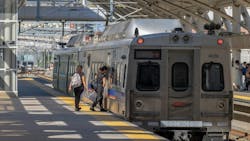Denver RTD board proposes 2026 budget with no major service cuts, fare increases
The Denver Regional Transportation District (RTD) has published its 2026 proposed budget, amounting to $1.3 billion, including its operating expenses, state of good repair work and debt service before carryforwards. The proposed budget brings expenses in line with Denver RTD’s Strategic Plan, limits the impacts to service and retains the workforce the agency says is needed to meet its goals..
“In the region and across the country, several businesses, organizations and municipalities are navigating significant financial uncertainty,” said Denver RTD General Manager and CEO Debra Johnson. “For many public transit agencies, including RTD, the near-term financial outlook is challenging and will require a deliberate and forward-thinking approach to balance expenses and revenue. The agency must make budgetary decisions that will safeguard RTD’s long-term financial health and ensure it is to continue delivering essential transit services and connections in the Denver metro area.”
The proposed budget appropriations do not host any capital carryforward expenses from the previous 2025 budget. Not including the impact of the East Colfax Bus Rapid Transit (BRT), the agency’s revenue budget is expected to increase 6.4% to $1.14 million over the 2025 budget. Denver RTD notes that its labor and purchased transportation expenses make up more than two-thirds of operating expenses in the proposed budget.
Denver RTD is primarily funded via the collection of a 1% sales and use tax in the Denver metro area, making up three fourths of the 2026 expected revenue. The agency says the sales and use tax can be impacted by things like external market factors, including inflation, recessions and the availability of goods and services. The proposed budget works to account for unknowns in the financial climate.
The University of Colorado Boulder’s Business Research Division (BRD) at the Leeds School of Business carried out third-party research to provide Denver RTD with semi-annual sales and use tax forecast models. In September of 2025, the BRD projected a 1.2% increase in sales and use tax revenue for the following year, with a forecast of $877 million versus their latest forecast for 2025. The BRD is estimating $877 million in 2026, 2.9% lower than the 2025 budget, as projections for 2025 have fallen in review since the 2025 budget was adopted last November. In 2026, this revenue is forecasted to make up 77% of Denver RTD’s expected funding before the impact of East Colfax BRT. Denver RTD uses BRD’s medium forecast financial models to develop its annual budget and five-year financial forecast to be reviewed and adopted at the end of each year.
Funding is being pared back in 2026 for service contracts that did not meet the anticipated budget costs for 2025, resulting in $17 million in projected savings for the agency. Denver RTD’s partnership program could also see changes resulting in $2 million savings. For 2026, the agency’s closed (legacy) pension plan contribution for salaried employees is set at $7 million in 2026 since the plan is considered adequately funded, as opposed to the $15 million budgeted for 2025. Other proposed budget reductions include the delayed hiring for 81 vacant positions, which the agency suggests will yield $7 million in savings. Further, Denver RTD also plans to modify overtime procedure that is expected to save the agency $5 million.
There is no planned force reduction for 2026, though the proposed budget does not include a cost-of-living adjustment or merit increase for non-represented employees.
The new budget also includes recommendations for $20 million in debt financing for vehicles that are used for paratransit services and FlexRide. The plan proposes a prepayment of $57 million in debt obligations for 2026 to strengthen Denver RTD’s financial outlook. The 2026 proposed budget includes no change to the FasTracks Internal Savings Account, the balance of which is currently $192 million. The capital replacement fund is proposed at $166 million, though that figure is not expected to be sufficient to cover the cost of capital requirements through the end of the decade. According to fiscal policy, the operating reserve of $227 million is set to three months of operating expenses.
Denver RTD says it will continually monitor the budget throughout the following year and will make adjustments as necessary, while it tries to avoid actions that would postpone funding for preventative maintenance or equipment replacement.
The board will consider taking action on the proposed budget in December following a public hearing. Riders and community stakeholders can attend the meeting to provide comment on the budget that would stretch throughout 2026.
